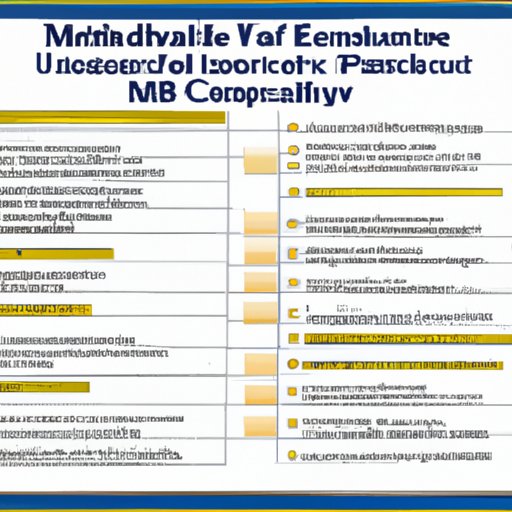Introduction
Medicare is a federal health insurance program that provides coverage for people over 65 years old and certain younger individuals with disabilities. It is one of the largest public health insurance programs in the United States and covers about 60 million Americans each year. Understanding the eligibility criteria for Medicare can help you determine whether you are eligible for coverage and the type of coverage you may need.

Overview of the Eligibility Criteria for Medicare
In order to qualify for Medicare, you must meet certain criteria based on your age, disability status, or end-stage renal disease (ESRD). Generally, you must be either 65 years old or older, under 65 and disabled, or have ESRD. Additionally, you must be a U.S. citizen or permanent resident, and you must have paid Medicare taxes for at least 10 years. If you do not meet these criteria, you may still be eligible for Medicare if you are a spouse of someone who is eligible.
Age Requirements for Medicare Enrollment
The first step in determining your eligibility for Medicare is to determine your age. Generally speaking, you must be at least 65 years old to qualify for Medicare. That said, there are certain exceptions for those who are younger than 65 and have a disability or end-stage renal disease.

Determine Your Eligibility for Medicare
Once you’ve determined that you meet the age requirements for Medicare, you should take the time to understand the other factors that could affect your eligibility. These include whether you are a U.S. citizen or permanent resident, whether you have paid Medicare taxes for at least 10 years, and whether you are a spouse of someone who is already eligible for Medicare.

Understanding the Age Requirements for Medicare Enrollment
If you are 65 or older, you are automatically eligible for Medicare. According to a study by the Kaiser Family Foundation, “Nearly all adults age 65 and older are eligible for Medicare, regardless of income, resources, or health status.” For those who are younger than 65, they may be eligible for Medicare if they meet certain criteria related to their disability status or end-stage renal disease.
When Can You Start Receiving Medicare Benefits?
If you are 65 or older, you can start receiving Medicare benefits as soon as you become eligible. However, if you are younger than 65 and have a qualifying disability, you may need to wait up to 24 months before you can receive Medicare benefits. Those with end-stage renal disease (ESRD) can start receiving benefits right away.
Different Types of Medicare Coverage
Once you are eligible for Medicare, you can choose from several different types of coverage. The most common type of coverage is Original Medicare, which includes Part A (hospital insurance) and Part B (medical insurance). Other types of coverage include Medicare Advantage plans, Medicare Supplement Insurance, and prescription drug plans.
Original Medicare
Original Medicare is the traditional fee-for-service plan that covers hospital visits, doctor visits, and other medical services. It does not cover prescription drugs, so you may need to purchase a separate prescription drug plan. Original Medicare is available to anyone who is eligible for Medicare, regardless of age or income.
Medicare Advantage
Medicare Advantage plans are private health insurance plans that are approved by Medicare and provide additional coverage beyond what Original Medicare offers. These plans typically cover prescription drugs, vision care, dental care, and other services. Medicare Advantage plans are available to anyone who is eligible for Medicare, but they vary depending on where you live.
Medicare Supplement Insurance
Medicare Supplement Insurance, also known as Medigap, is supplemental insurance that helps cover the gaps in Original Medicare coverage. These plans can help pay for costs such as copayments, coinsurance, and deductibles. Medicare Supplement Insurance is available to anyone who is eligible for Medicare, but the plans vary depending on where you live.
Prescription Drug Coverage
Prescription drug coverage is available through both Original Medicare and Medicare Advantage plans. This coverage helps pay for medications prescribed by your doctor. Medicare prescription drug plans vary depending on where you live.
Conclusion
Medicare is a federal health insurance program that provides coverage for people over 65 years old and certain younger individuals with disabilities. In order to be eligible for Medicare, you must meet certain criteria based on your age, disability status, or end-stage renal disease. Generally, you must be either 65 years old or older, under 65 and disabled, or have ESRD. Additionally, you must be a U.S. citizen or permanent resident, and you must have paid Medicare taxes for at least 10 years. Once you are eligible for Medicare, you can choose from several different types of coverage, including Original Medicare, Medicare Advantage plans, Medicare Supplement Insurance, and prescription drug plans.
Understanding the eligibility criteria for Medicare can help you determine whether you are eligible for coverage and the type of coverage you may need. If you have any questions about your eligibility, it’s best to speak with a qualified health care professional.
(Note: Is this article not meeting your expectations? Do you have knowledge or insights to share? Unlock new opportunities and expand your reach by joining our authors team. Click Registration to join us and share your expertise with our readers.)
